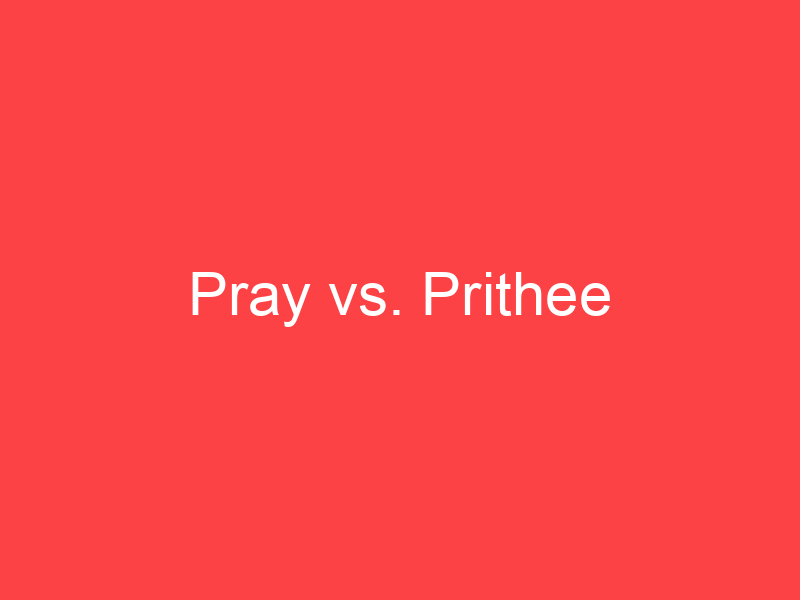-
Pray
Prayer is an invocation or act that seeks to activate a rapport with an object of worship, typically a deity, through deliberate communication.
Prayer can take a variety of forms, it can be part of a set liturgy or ritual,
it can be performed alone, or in groups.
Prayer may take the form of a hymn, incantation, formal creedal statement, or a spontaneous utterance in the praying person.
The English term prayer is from Medieval Latin precaria “petition, prayer”.
The Vulgate Latin is oratio, which translates Greek
προσευχή in turn the Septuagint translation of Biblical Hebrew תְּפִלָּה tĕphillah.
In the narrow sense, the term refer to an act of supplication or intercession directed towards a deity, or a deified ancestor. More generally, prayer can also have the purpose of thanksgiving or praise, and in comparative religion is closely associated with more abstract forms of meditation and with charms or spells.
Today, most major religions involve prayer in one way or another; some ritualize the act, requiring a strict sequence of actions or placing a restriction on who is permitted to pray, while others teach that prayer may be practiced spontaneously by anyone at any time.
-
Prithee
Prithee is an archaic English interjection formed from a corruption of the phrase pray thee ([I] ask you [to]), which was initially an exclamation of contempt used to indicate a subject’s triviality. The earliest recorded appearance of the word prithee according to the Oxford English Dictionary was in 1577 and the last appearance was in 1875 while it is most commonly found in works from the seventeenth century. The contraction is a form of indirect request that has disappeared from the language.Prithee is the most widely known example of second person object enclitics. Linguists consider it to have been the final step in the grammaticalisation of the verb pray. The eventual use of prithee outside the thee/thou usage signalled its transition into a discourse particle.There has been extensive scholarship investigating the difference in usage of prithee as opposed to pray you, both in terms of politeness and grammaticalisation. Because prithee eventually came to be used in the same context with the word you, it is considered to have developed into a monomorpheme. Prithee was almost always used as a parenthesis in order to introduce indirect questions and requests.
Prithee and pray you often coincide in Early Modern English texts, and the difference between the two terms has been debated by scholars. Scholars such as Roger Brown and Albert Gilman have suggested that prithee was an ingroup indicator. Other scholars suggest that it is simply the more deferential form. The relationship between the two is complicated by the phrase beseech you, which was used in the same time period and was clearly the form used most deferentially.Although the closest Modern English equivalent of prithee is please, the two terms presume different attitudes within the addressee. While please accompanies a request addressing itself to the positive desire of the addressee, as in “if it please you,” prithee accompanies a request which addresses itself to the threat of being answered in the negative, as though the request were against the addressee’s wishes. Stated otherwise, the word please suggests that the person being addressed is willing to comply with the request, whereas the word prithee suggests that he or she is not willing. This switch from stating the speaker’s contrary desire to stating the speaker’s wish not to impose signaled a cultural shift in the English-speaking world in which politeness became stated negatively rather than positively. Wider repercussions are observable in the replacement of such phrases as “excuse me” and “pardon me,” which request understanding or forgiveness, with “I am sorry,” which instead acknowledges the speaker’s remorse.In the Complete Works of Shakespeare, prithee occurs 228 times while pray thee occurs only 92 times.
-
Pray (verb)
To petition or solicit help from a supernatural or higher being.
“Muslims (or submitters) pray in the direction of Mecca.”
-
Pray (verb)
To humbly beg a person for aid or their time.
-
Pray (verb)
To communicate with God for any reason.
-
Pray (verb)
To ask earnestly for; to seek to obtain by supplication; to entreat for.
-
Pray (adverb)
Please; used to make a polite request.
“pray silence for…”
-
Prithee (interjection)
Short for “I Please.
-
Prithee (interjection)
please (used to convey a polite request)
“prithee, Jack, answer me honestly”

